#c!joan
Explore tagged Tumblr posts
Text
another au SASI au idea but like C!Thomas and C!Joan (yes we bringing Joan up in here we love them) are like scientists (more specifically Joan is the scientist and Thomas is the concentual lab rat) and Joan experiments by making 6 clones of Thomas (with consent ofc) just to see if cloaning is possible, doing/adding something a little different to each specimen for scientific experimentation. they do end up growing 6 different Thomas's but they all just end up breaking themselves free from their big ol containers with the science juice (y'all know what I'm on about) and they all come out different from eachother (mostly personality wise and I guess some of them appearance wise (specifically Janus)) and Joan and Thomas just babysit Thomas clones who have no idea what anything is
(totally didn't get this idea from after watching Sonic 3 which was fuckin phenomenal btw)
#sanders sides#thomas sanders#sasi#sanders sides au#remus sanders#virgil sanders#logan sanders#patton sanders#roman sanders#janus sanders#ts sides#ts remus#ts logan#ts janus#ts patton#ts roman#ts virgil#sasi logan#sasi roman#sasi patton#sasi virgil#sasi janus#sasi remus#c!thomas#c!joan
46 notes
·
View notes
Text

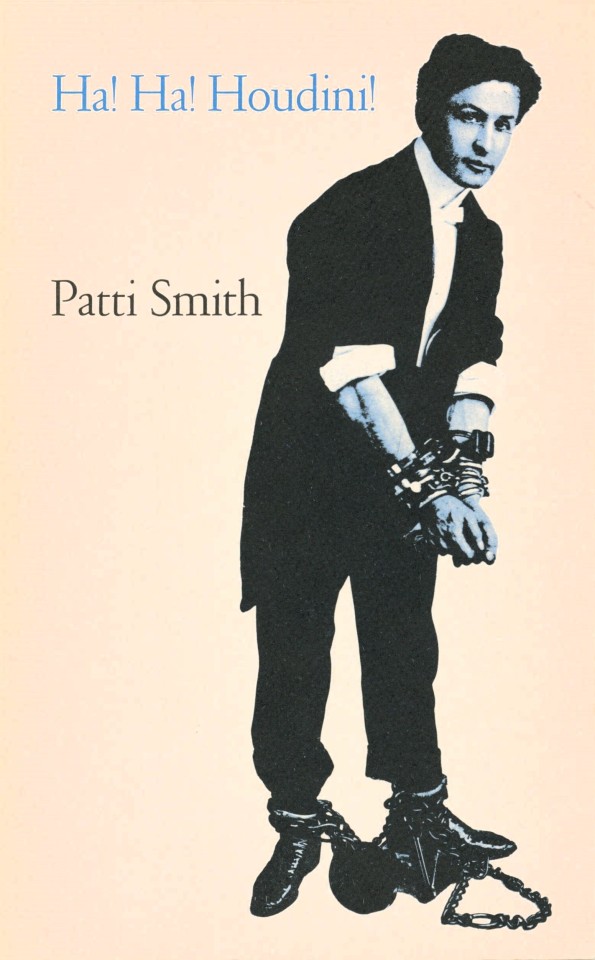
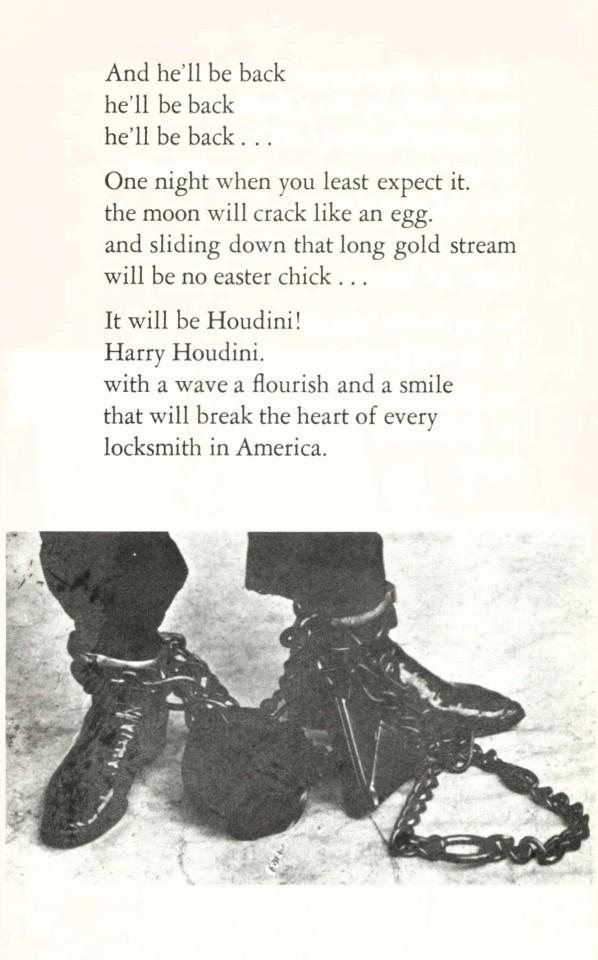
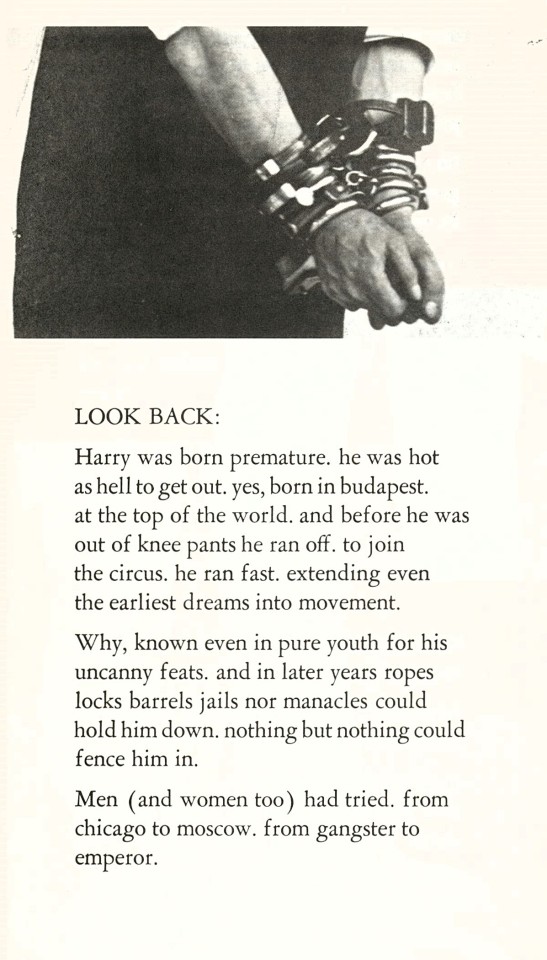
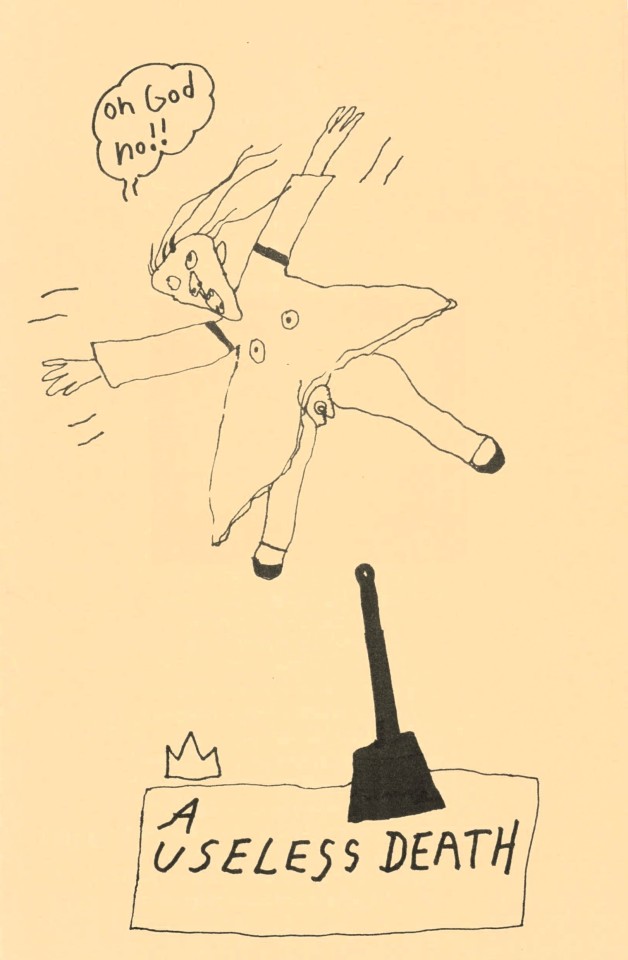
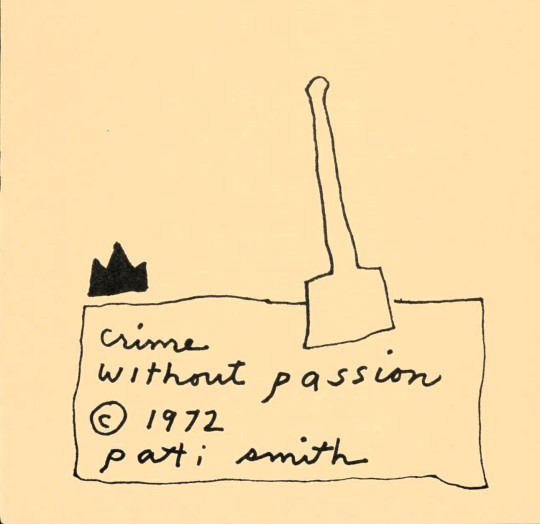
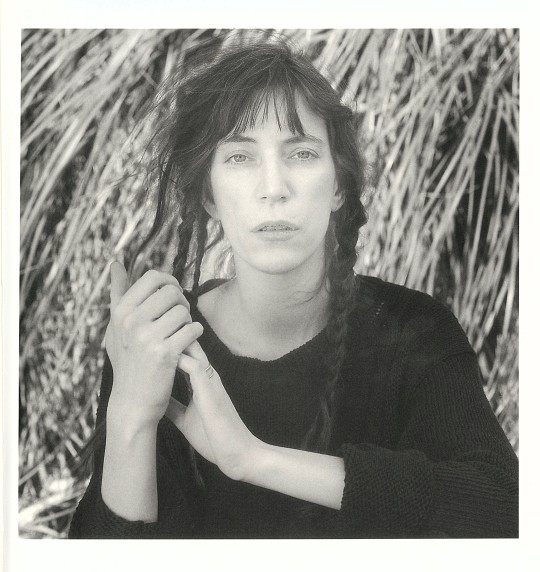
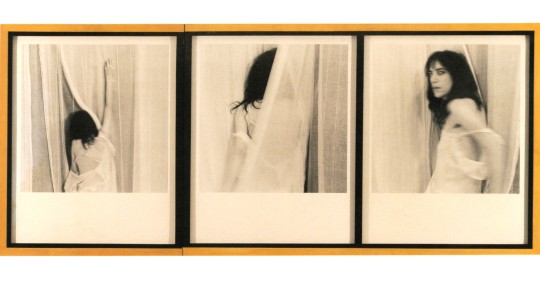
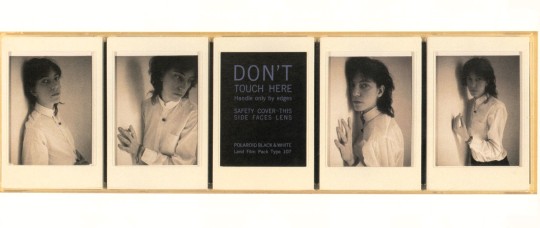
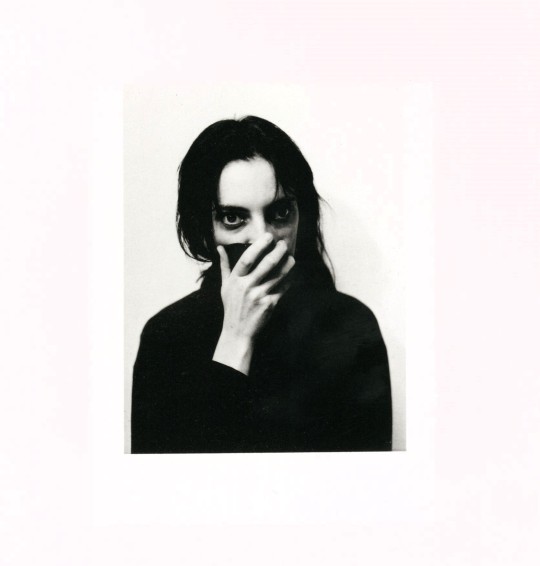
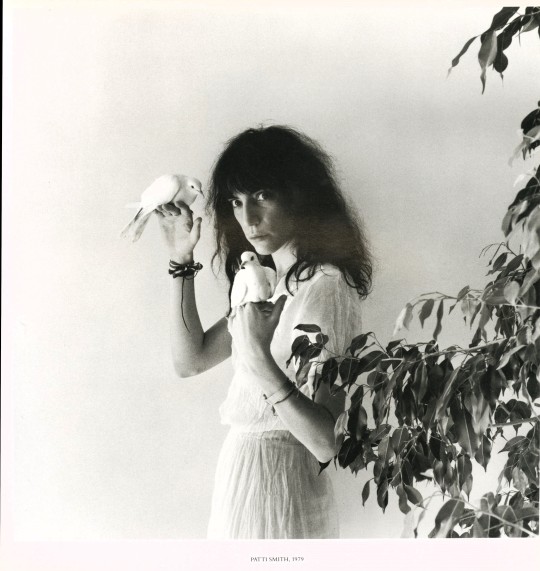
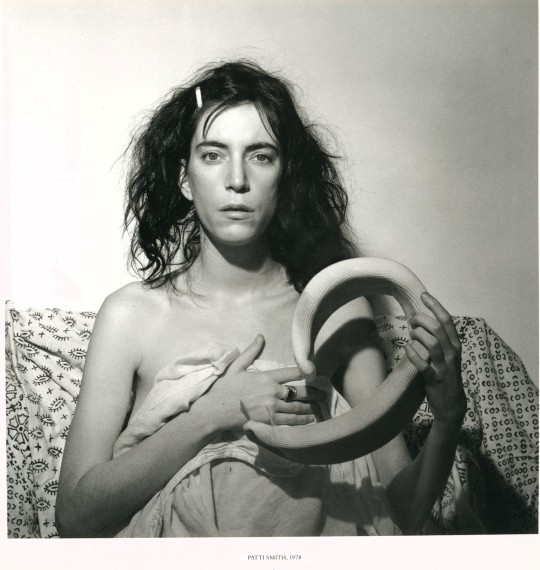
Milestone Monday
Poetry in Punk
On this day, December 30th, 1946, Patti Smith, a singer, songwriter, author, poet, photographer, and painter, was born in Chicago, Illinois. Often referred to as the "Godmother of Punk," Smith is known for her influential music that blends rock and poetry. Her debut album, Horses, released in 1975, is considered a landmark work in the punk rock genre. Beyond her music career, Patti Smith has written several books, including the acclaimed memoir Just Kids, which explores her relationship with photographer Robert Mapplethorpe and their experiences within the New York City artistic scene. Throughout her life, she has been a prominent cultural figure, advocating for artistic freedom and social change.
Images featured come from:
Our first edition of A Useless Death, a poem by Patti Smith that was published as a chapbook and distributed by Gotham Book Mart and Gallery in New York in 1972.
Ha! Ha! Houdini!, a poem written by Patti Smith and published as a chapbook. It was distributed by Gotham Book Mart and Gallery in New York in 1977.
Robert Mapplethorpe, released by Peter Weiermair and published by Robert Wilk in 1981. The contexts come from a catalogue of an exhibition sponsored by the Frankfurter Kunstverein, April 10-May 17, 1981, and features an introduction by Sam Wagstaff, the artistic mentor and benefactor to Robert Mapplethorpe and Patti Smith.
Some Women by Robert Mapplethorpe that features an introduction by one of the pioneers of New Journalism, Joan Didion. Our first edition was published in Boston by Bulfinch Press in 1989.
Robert Mapplethorpe by Richard Marshall with essays by American poet, literary critic essayist, teacher, and translator Richard Howard, and South African-born American writer and editor Ingrid Sischy. Our copy is the first cloth edition, published in New York: Whitney Museum of American Art; Boston: in association with Bulfinch Press: Little, Brown and Company in 1988.
Mapplethorpe prepared in collaboration with the Robert Mapplethorpe Foundation with an essay by American art critic, philosopher, and Professor Arthur C. Danto. This first edition was published in 1992 by Random House in New York.
-View more Milestone Monday posts
-Melissa, Special Collections Graduate Intern
#milestone monday#patti smith#milestones#Arthur C. Danto#robert mapplethorpe#photograhy#birthdays#punk#poetry#music#singers#songwriter#poet#author#punk rock#A Useless Death#ha ha houdini#Some women#Bulfinch Press#Gotham Book Mart and Gallery#Peter Weiermair#Robert Wilk#Frankfurter Kunstverein#Sam Wagstaff#joan didion#Richard Marshall#Richard Howard#Ingrid Sischy#Whitney Museum of American Art#Little Brown and Company
75 notes
·
View notes
Text

More Earth C au lore, Joan doesnt like that her mom is dating Karkat
104 notes
·
View notes
Text
now i know how c!wilbur felt
#coping so hard fuck all trumpies and fuck every one who voted jill stein#guess i’m gonna have to flee my home!!! yayyyyy!!!!#dsmp#dream smp#dsmpblr#c!wilbur#cwilbur#dsmp wilbur#and know i know how joan of arc felt 🎶🎶🎶🎶
28 notes
·
View notes
Text
unplotted starter for @dccontramundum because I'm crazy about this scene and it's Anchor's fault
"I can't. I can't." How could she possibly go home, after all of this? "I've made such a mess of things. I just... don't know what to do." She looked down again, ashamed, and hugged herself slightly. Really, she wasn't even sure why she'd come here, except that Morse, somehow... felt safe.
"Marry me."
She looked up sharply, mouth falling open with shock. He can't have possibly- What-? A thousand conflicting thoughts and feelings crossed her mind and her face. Marry him? While she's carrying another man's child? Another man's bruises? When they'd never so much as been on a date? Marry her father's constable? Marry the man who... the man who she'd come to, after everything.
But he didn’t know it all, and to burden him with that... the last thing Morse needed was another burden--he gave himself enough of them.
He swallowed and she stared and it felt like ages passed. Then she had to try several times to come up with anything she could say--to force words out. "Morse. I-" She looked down, shook her head. Then she looked up again, bit her lip, just for a second. And she took a step closer.
225 notes
·
View notes
Text

in honour of the alien audiocommentary confirming that everyone's having rampant gay sex in space, behold: I have made... a chart
#alien 1979#alien franchise#gay#lesbian#transgender#ellen ripley#sigourney weaver#arthur dallas#tom skerritt#john hurt#gilbert kane#dennis parker#yaphet kotto#joan lambert#veronica cartwright#samuel brett#harry dean stanton#ashposting#ian holm#I wish I could retroactively post this to all those alien/avp forums active c.2009. they would want to kill me#anyway this is lighthearted. just me being silly#the way I could justify all of these#the way I might do just that#lenhcs#with a pinch of salt
51 notes
·
View notes
Text

@i8utl3rtr0n last night I had a dream I was pregnant with Mrs cs baby??
#clone high#tophabe slander#candide sampson#leslie bosf#mr b#mrs c#scudworth#joan of arc#shitpost#so sorry about this chat
25 notes
·
View notes
Text
also mona lisa smile was sooo gay like i cannot believe there was not a single canon lesbian couple in this movie, it was barely subtext
#first i thought giselle and connie#then i was like katherine and amanda#then giselle and just any woman really she's written so gay#man#joan was the only one i was convinced is straight but like she was cool she was happy with her tommy#mona lisa smile#*c
187 notes
·
View notes
Text
le départ
Lou + Rosie, a succession of trains, and a Westland Lysander, for @mercurygray! A follow-up to this wonderful piece, an AU in which Merc’s Joan and my Louise are running an escape line.
It is a morning of ragged cloud and fitful sunshine, the southern outskirts of the city rinsed by the recent rain and buffed up to a shine by the wind. The cold, hard light throws everything into sharp relief: the acres of cheap housing, the wasteland of railway sidings and warehouses and factories, the handful of people waiting on the platform at Ivry. They carry bags and suitcases and have a dark, shuttered look about them. No one speaks. This is Paris in its fourth year of occupation: the silver city, tarnished and battered, silence and suspicion amongst strangers.
Louise and Robert stand apart from the other travellers, huddled against the wind, his arm around her shoulders and hers around his waist. Casual, patient, as though none of this really matters. They are just a young suburban couple, newlyweds, heading to the country for the weekend.
The Bordeaux train draws in from the Gare d’Austerlitz, wheezing steam, half an hour late and already packed, even in the first-class carriages. Louise appeals to an elderly woman sat by the window, asking if she would move so that she and her husband might sit together. The woman sighs and grumbles, glaring at them with rheumy eyes, but eventually they are settled, shoulder to shoulder, hip to hip. She can feel the warmth of him even through the layers of his clothing, the sweater Ferraby had offered up, its sleeves a little too short for Robert, the suit and thick wool coat in a nondescript grey that she and Joan had chosen with care. As the train heaves itself into motion and gathers speed, he turns his head to look out of the window, and she turns her head to look at him. If only… she thinks, but stops herself.
If only we really were going away for the weekend. If only this journey would never end. If only the war was simply something happening to other people.
At Étampes, an inspector walks down the corridor, stepping over people and luggage, calling for tickets. He stops at their compartment, a police officer behind him, and there is the dutiful pause while people rifle through handbags, search through pockets. Louise takes out her ticket, waits a second while Robert does the same, following her lead, and then hands both of them over. The man glances down at the tickets, and up again at their faces, and passes them back. Then the door slides closed and he and the policeman are gone.
With great sighs the train traipses on into the flat farmland of La Beauce, where the fields are brushed green with sprouting winter wheat and the sky is a cool blue.
In the outskirts of Orléans they slow. The marshalling yards of Fleury-les-Aubrais have recently been bombed and everywhere there is wreckage, wagons thrown about, rails twisted and knotted, the ruins of buildings still smoking. In silence people stare out of the window at these signs of what is to come, while the carriages rattle and jolt over the single track that has been repaired.
At the station itself, doors slam and people come and go. They hear heavy footsteps in the corridor, Germans this time, two sergeants of the Feldgendarmerie in their grey uniforms and silver breastplates, flanking another man in a belted raincoat and trilby, a uniform in itself. Louise and Robert hand over their tickets and the identity cards bearing the names Anaïs Hélène Gauthier and Maxence Charles Gauthier.
“You are travelling to Angoulême?” the Gestapo officer asks. He speaks French well, which she always finds unsettling: no hope of hiding behind incomprehension, of playing for time with confusion.
“Yes.”
“For what purpose?”
Louise glances at Robert with a small smile, reaches for his hand. “We’re having a few days away.”
The German looks between them and then back at their papers, turning them over in his hands, lingering. Time seems to slow. Louise holds Robert’s hand tightly in hers, feeling his pulse racing against her own skin, just as her thoughts are racing. How would she act if she were entirely innocent, if she really were a young Frenchwoman taking a trip with her husband? How would Anaïs Gauthier behave? She would hardly care at all, would sit there and deal with it, this little interruption to her day.
And so Louise puts her hand on Robert’s cheek, tilts his face down to hers, and kisses him. Nonchalance, Gallic insouciance, in the face of everyday inconvenience.
At last the Gestapo officer turns his attention away from them. Questions are asked of the other passengers in the compartment, and then he tells them all to wait and steps outside with their documents.
The elderly woman sighs, and the two men sat next to her, minor bureaucratic types, mutter in low tones, complaining about the delay, wondering if they will still make their meeting in Blois. Louise says nothing. Sweat prickles under her arms, in the small of her back. She can feel the dampness of Robert’s hand, as well, and still the thud of his pulse.
He puts his mouth close against her ear and says, so quietly only she can hear: “What are they doing?”
She forces herself to smile, coyly, as if he has just whispered an endearment. She turns her face into his neck and then tips her head up to murmur into his ear, her voice no louder than a breath. “Checking lists. Noting names. Don’t know.”
The door opens again with a crash and the officer reappears. “Alright,” he says, passing the documents back, before he and his military policemen head into the next compartment.
Don’t ever look relieved, she had been told at Beaulieu. The instructor’s voice echoes in her ear, even at the distance of two years and hundreds of miles. Don’t look relieved, because being relieved means you were scared, and being scared means you have something to hide. Louise keeps her expression calm, indifferent, but as she returns her identity card to her handbag Robert smiles at her, and she can’t help but smile back, a hint of triumph in her eyes.
The train jolts forward, and they are moving again at last, on through the city of Orléans itself, the city of la Pucelle, Sainte Jeanne d’Arc. Louise thinks briefly of Joan, her Joan, who had seen her off the night before last with deux bisous and a handful of francs Louise was sure had come from Joan’s own purse and not from London. Hardly a maiden, dressed not in breeches and armour but in immaculate skirt suits, and still the kind of woman to be spoken of with something approaching reverence.
Louise smiles a little to herself, looking out of the train window at France, for which she had come in the first place, and thinking of Joan, and Ferraby, and all of her comrades, and every airman she had guided back into the fight, for whom she had stayed.
Soon they are out of the city and into the bare fields of the floodplain with the line of the river visible as a distant fringe of willows. Robert dozes, his cheek resting against the top of her head, while Louise pretends to sleep and instead keeps track of the other passengers in the compartment. The pair of government officials leave for their meeting in Blois, and two young women take their place, gossiping in low and urgent voices about a man they know, a real salaud, who is going with two girls at once. Should they tell the girls? The debate goes on without ever reaching a conclusion. At Amboise, the man sat next to Louise disembarks, and a mother with a small child replaces him. The train rumbles across the river on a stone bridge and edges its way through the drab suburbs of Tours. Only the elderly woman remains, but when Louise makes a show of waking, just before Saint-Pierre-des-Corps, she sees that the woman is fast asleep, her head nodding on her chest. No one who heard Louise mention Angoulême sees them stand up and retrieve their suitcase and shuffle down the corridor to the end of the carriage.
Robert jumps down onto the platform and takes the suitcase from her, and then holds her around the waist and lifts her down beside him. The guard blows his whistle and the train draws away, leaving a scattering of passengers behind. They file towards the exit while Louise and Robert walk towards the concourse and the ticket office.
They stand on the platform on the other side of the station, waiting for the slow train to Vierzon. It is deserted: there is no one around, no one else taking the train with them, no one to notice them on this February afternoon with the sun casting long shadows and the wind cold on their faces. When the train arrives it is empty, too, and they climb into a compartment and lean back against the faded and threadbare plush.
She touches his arm. “Not long, now,” she says, and he nods, looking at her steadily.
Outside on the platform a whistle blows, and the train lurches forward, on into the countryside. Through their pale reflections in the window are the flat fields of the floodplain between the Loire and the Cher, stretching away to the horizon, brushed with the glow from a setting sun. The sky is a luminous blue like the blue of a stained-glass window. Poplars stand like plumes in the drift of sunlight.

At Azay-sur-Cher a young man is waiting for them. He flicks away the stub of his cigarette and comes forward to greet Louise, kissing her on both cheeks while the two of them go through the little rigmarole of the double password.
She turns to Robert, puts a hand on his elbow. “This is Guy, our air movements officer,” she explains. To the Frenchman she says: “Voici Bob!”
Guy grins, a handsome, boyish grin. “Salut, Bob, ��a va?”
“Uh…” Robert takes his outstretched hand and shakes it. “Ça va?” he replies, glancing at Louise with a small smile, and she nods, beaming back at him, both of them remembering sitting in the attic of the atelier, stifling laughter as he stumbled through the phrases she was trying to teach him.
Guy leads them to a shed behind the station house where four bicycles are stored. He wheels the spare one beside him as they cycle off into the gathering dusk, over the level crossing and onto a single-track road meandering through the fields. The land is flat and bare and unending, broken only by lines of poplars planted as windbreaks, willows along the rim of a drainage ditch. Through the trees to the east the moon is rising, replacing the dying sun with its own silvery light.
After a few miles they turn off onto a farm track and bump over ruts and potholes out into the fields. Guy brings them to a halt by a small copse, and dismounts to survey the pasture stretching out before them, looking left and right, squinting into the gloom, taking a few experimental strides over the rough earth and patchy grass.
He returns to them and starts speaking to Louise, and she translates for Robert. “He says things look fine. All okay. There are no obstructions and the ground is firm enough for the aircraft to land. The only worry tonight is fog.”
Behind the copse is a dilapidated barn, empty but for some rusted farm equipment half-covered by canvas tarpaulins. A scant covering of straw is strewn across the floor, and cobwebs hang thickly in every corner and across the walls. Guy and Louise move with well-practised ease, slipping wordlessly into the routine. The Frenchman crosses over to a bundle of fence posts propped against the wall, and selects three stakes about four feet long, each with an end sharpened to a point, while Louise lifts the corner of a sheet of tarpaulin and retrieves some lengths of string and four torches, and tests each one in turn.
“Wait here,” she tells Robert, and she and Guy head outside to set things up.
There is just enough light to see by as they walk out into the field. A hundred yards out Guy plants one stake in the ground and waits while Louise fastens a torch to it. Then he sets off into the distance, marching with wide steps as if performing some ancient and arcane ritual, while she follows behind him, their footsteps leaving a trail in the dewy grass like the wake of a ship in still water. They position the second stake and the second torch, and pace to the right to repeat the process for a third time. Guy glances back at their work, the stakes only visible as vague shadows, and nods at her, satisfied.
Back in the barn they make themselves as comfortable as possible, unwrapping the food Louise and Robert have brought in their suitcase, and sipping ersatz coffee from a flask Guy produces from his satchel. They leave the door open despite the chill night air, using the light of the moon to see rather than risking switching on the torch Louise has kept in her coat pocket.
Guy turns to Robert and says something in French, a question which makes Louise laugh, a bright, young sound out of place in the shadowy and derelict barn. Robert looks at her, curious, and she translates for him: “He asks if you’ve flown before.”
Robert starts to smile. “Just a couple times,” he says wryly.
She looks back at the Frenchman. “Bob is an American airman. A pilot.”
Guy nods, realisation dawning, and makes an apologetic shrug. He says something else, and again Louise laughs and explains for Robert. “He says, she never tells me anything. Whether our guests are British or American, soldiers or airmen. Sometimes I ask foolish questions, but it is good security.”
Another flutter of French passes between them and they share soft laughter at some private joke. Then Guy straightens up and begins speaking to Robert, breaking off every now and then for Louise to translate.
“He says as you have flown many times before you know there is nothing to fear. But we must still explain to you our way of doing things. As it will be quite different to what you are used to.”
She waits while Guy brushes some straw aside and lays out three coins on the floor, forming an inverted ‘L’. “We have positioned three markers out in the field,” she explains, her soft English following Guy’s rapid French, “like this. The pilot will touch down at the first marker, here. He brakes, and stops at the second marker. Then he turns around the third marker and comes back to the first, where we’ll be waiting.”
Again she pauses. “The passengers jump down and unload their luggage, and then you climb up the ladder. There will be a parachute in the aircraft for you, and a flying helmet and oxygen mask.”
Robert frowns. “Will we need oxygen?”
“No, no, but that’s where the microphone is. For the intercom.” Louise smiles at him as he nods. “Every airman I’ve met wishes we had throat microphones like you Americans, but…” She shrugs. “Everything will be plugged in, but you’ll have to flick the on-off switch on the front of the mask when you want to speak.”
They take him through the procedure a second time: where they will stand, where the Lysander will land and turn, what they all must do. Robert listens intently, his eyes fixed on Guy and then on Louise in turn, a small furrow between his brows. It will be fine, they tell him. The whole thing will take no more than five minutes.
“—comme sur des roulettes,” Guy says.
Louise searches for the best translation, and settles on: “Easy-peasy.” She smiles again. “Is that all alright?”
Robert nods. “Yeah. Easy-peasy,” he repeats, and smiles back at her. “Will you, uh—will you tell him that I understand? And will you thank him for me, please?”
She turns to Guy and passes the message along, and the young Frenchman grins, and reaches out to shake Robert’s hand once more.
Presently Guy goes outside to check the landing zone, worried about the police, German troops, worried, above all, about fog. Alone again, Louise and Robert sit close together, leaning into each other.
“You’ll be in England by daybreak,” she tells him. “Before, even.”
“Yeah.” He is quiet for a moment. “Where are you headed? Back to Paris?”
“Mmm. Yes.”
Neither of them says anything more, aware that time is running out, wanting to hold on to the illusion that the night will spin on forever. They wait in silence, even when Guy returns, watching the rectangle of sky through the open door. Overhead, Orion the hunter tilts like a windmill, dragging a whole panoply of constellations behind him, and the moon climbs higher and higher, flooding silver across the fields.
At midnight, Guy gets to his feet and stretches. “Let’s get ready,” he says to Louise. She and Robert follow him out into the moonlight, ghostly shadows moving across the pale countryside. Underfoot the ground is hard with frost. Ribbons of mist are wrapped around the trees along the edge of the field and a bank of fog lies over the river.
“Look,” Guy mutters, pointing. “Fog. It could ruin everything.”
“I know,” Louise whispers back. “But there’s nothing we can do. We just have to wait.”

They wait. Dark figures in a monochrome landscape, staring at the stars, painted by the moon. Cold seeps into them. There are the sounds of night, the distant barking of a dog, the susurration of the icy breeze, and underneath everything the sound of the nearby river. And then something else.
“Can you hear that?”
“What?”
It dies away. Did she imagine it? But the sound returns, a murmur becoming a rumble.
“That’s it!”
Now there is no doubt: an aero engine, the sound coming and going on the breeze and then settling to a steady drumbeat. Louise hands the torch to Guy and he points it up into the night sky, flashing the letter ‘P’ in Morse code. The letter ‘Q’ comes back to them, a small star blinking in the blackness.
Robert points. “I see it!”
Louise turns on the first torch and sets off to the other stakes, running, stumbling on the hard, uneven ground. She reaches the second marker and snaps the torch on, then crosses to the third. As she sprints back to where the men are waiting she sees the Lysander above her, a black shape against the spray of stars.
The aircraft turns towards them, shedding height, growing larger and larger, tilting in the flow of air. The noise of the engine rises and falls as the pilot jazzes the throttle. Suddenly, shockingly, its landing lights are switched on, as brilliant as spotlights so that on the ground they seem exposed to view like figures on a stage. Then, slowly, deliberately, it touches down, bounces, hits again, and rumbles down the flarepath. They watch it turn at the second lamp, and the third, and come back towards them where they wait, deafened by the din, beside the first.
The slipstream hits them as the aircraft turns once more and points into the wind. Guy waves at the pilot in the cockpit and runs up to talk to him. In the rear of the cockpit two passengers are moving. The hatch slides back and a figure emerges and climbs down the ladder to the ground.
Louise turns to Robert, glancing at his eyes, the slope of his nose in the moonlight. She clutches the sleeve of his coat, almost desperately. He faces her, puts his mouth close to her ear.
“Thank you,” he says, half-shouting to be heard over the engine. “Thank you for everything. I wish I could say more.”
She shakes her head, and leans back so that he can see her smile. Then she leans up on her tiptoes. “In this line of work we consider it bad luck to say ‘good luck’,” she tells him, her own voice raised. “So I’ll just say bon voyage. And I hope never to see you in France again.”
He grins back at her. By now the second agent is on the ground and Guy is shouting from beside the nose of the aircraft, his words picked up by the propellor blast and thrown back at them in disorder. “Need—go! Get—quick!”
Louise ushers Robert over to the Lysander. Time hurtles at her—the engine roaring, the propellor a blurred disc against the moonlight, the stars rampaging across the sky—and she just stares at him, wanting to tell him so many things and unable to say them. He nods, as if he has read her mind, and puts one hand on the side of her face and leans down to kiss her.
Then he is gone, up the ladder and into the cockpit, and the pilot gives the thumbs-up, and Louise and Guy run back from the aircraft.
“Go!” Guy yells, gesturing downwind with his hand. “Go, go!”
The engine gains noise, roaring and raging at the night, straining for a moment against the brakes before lurching forward, bumping along, gathering speed, with Robert looking back at her, his face no more than a smudge of whiteness and shadow. Then abruptly the Lysander is in the air, a matte black shape against the luminous black of the sky, climbing, turning, swinging through the stars, and leaving Louise standing in the backwash, her hair blowing in the wind, her coat flapping around her, in tears.
The sound of the Lysander fades into the minutiae of the night. Suddenly she is cold.
Beside her, Guy is shaking hands with the two men, welcoming them to France. She stands for a moment longer, running through what she must do: clear up in the field and the barn, share out the men’s clothing in her suitcase amongst the new agents, put the identity card for Anaïs Gauthier into a slip in the lining and retrieve the papers for Irène Françoise Brochard. Cycle to the safehouse Guy has found for them, and, in the morning, catch the first train to Vierzon and escort the agents to Paris. Move on, get back to work. Keep going.
Guy is looking at her expectantly. She wipes the tears from her cheeks and puts on a smile and walks over to the men waiting for her.
#This was meant to be short. And then.#floydmtalbertfic#OC: Louise Johnson#OC: Joan Warren#C: Rosie Rosenthal#I had a lot of fun writing this; Merc! I hope you enjoy 💕
16 notes
·
View notes
Text






Stand-In (1937) Tay Garnett
August 31st 2024
#stand-in#1937#tay garnett#leslie howard#joan blondell#humphrey bogart#marla shelton#alan mowbray#jack carson#c. henry gordon#william v. mong
10 notes
·
View notes
Text




um.. i might be having some alt fc Thoughts.
#OOC.#[ i love antje and she has a very accurate face but ]#a) she's not In that much and she's almost always presenting very feminine lol#and b) this hair cut is peak ME3 alice#also c) this is the second non binary actor that has given me shepard vibes and i feel very 🤝 using them for a butch lesbian bc of overlap#as in there are a lot of nb and masc/butch lesbians who have things in common#oh and d) emma's nose.#ALICE JOAN SHEPARD: AESTHETIC
12 notes
·
View notes
Text
hehehehehehehehe


I definitely like this poster~
#marie tells things#the way Toph’s squinting at Joan oh myyyyyyy 👀#this poodle boy’s up to no good!#and I’m pretty much intrigued! C:<#clone high reboot#clone high#joan of arc clone high#topher bus
23 notes
·
View notes
Note
jade harley???
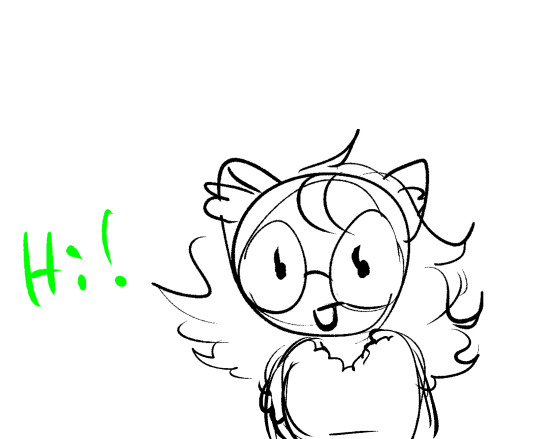
Jade Harley!!
(also idk if your asking about jade harley in the earth c au or not so... I'll put some info after the read more)
-She is a biologist working in a lab searching for the properties of the plants and how this can be used in medicine or how they affect differently in trolls, humans and carapaces
-She also helps in the community garden on her community and the reason Karkat moved to that area and are neighbors
-Has been a single(?) mom for 16 years after a couple of bad romances and loneliness taking over her life and deciding that she could do this on her own and got help from Roxy to create her ectokid, Joan Harley
-Lived with Karkat and Dave for some years and they helped her while she studied and went to college, she moved out after their relationship started declining and made things awkward in the house
-She moved around with Jane and Dad, June and even Rose and Kanaya until she finally was able to save enough to get her own house in a little community a little far away from the city, but still close enough that she can get to her job in commute
-Livin with Rose and Kanaya and taking care of grub Anis is probably why she wanted to become a mother in the first place
-She was the one who recommended Karkat to search for a therapist to help him after the davekat breaking up fiasco, she would also start her own journey, but much later in life after [Spoilers from the Crossing timelines I cant talk about] happened
-Has an up and down relationship with her daughter, Joan. They have reallyyyy contrasting personalities, Jade not wanting her to ever feel as lonely as she did and this making feel Joan as she is suffocating and wants to be left alone
#homestuck#jade harley#joan harley#earth c au#my art#karkat vantas#dave strider#rose lalonde#kanaya maryam#jane crocker#ask
57 notes
·
View notes
Text
06.30.24 20th annual performance in Terry Riley's In C, performed by NYC In C.
Brian Chase - drums, Billy Martin - drums, Aba Diopsabar -percussion, Zach Layton - 17-string bass (electric), Luke Stewart - upright bass, Henry Fraser -electric bass, Ava Mendoza - guitar, Elliott Sharp - guitar, David Grubbs - guitar, Bobby Previte -percussion, Nava Dunkelman - vibraphone, Shayna Dunkelman - vibraphone, Levy Lorenzo -marimba, Matt Evans - marimba, Ursula Oppens - Steinway piano L, Adam Tendler - Steinway piano R, Qasim Naqvi - synth, Ben Vida - synth, Miya Masaoka - koto, Zeena Parkins - harp. Neel Murgai- sitar, Erica Dicker - violin. gabby fluke mogul - violin, Laura Ortman - violin, Joanna Mattrey - viola, Jessica Pavone - viola. Cleek Schrey - viola. Alex Waterman - cello. Andrew Yee - cello. Lester St. Louis - cello. Kaoru Watanabe - shinobue flute, Laura Cocks - flute, Katie Porter - clarinet, Peter Hess - bass clarinet Matana Roberts - soprano saxophone, Lea Bertucci - alto saxophone, James Fei - alto saxophone, Zoh Ambatenor - saxophone, Peter Gordon - bari saxophone, Katherine Young - bassoon, Kyra Sims - french horn, Nate Wooley - trumpet, Ben Neill - trumpet, Chris Williams - trumpet, Peter Zummo - trombone, Chris McIntyre - trombone, Marcus Rojas- tuba, Joan La Barbara - voice. Gelsey Bell - voice, Nick Hallett - voice, Tariq El Sabir - voice, Raquel Acevdeo Klein - voice, Isabel Crespo Pardo - voice, Angelica Negron -accordion
#NYC In C#Terry Riley#Brian Chase#drums#Billy Martin#Angelica Negron#Isabel Crespo Pardo#Raquel Acevdeo Klein#Tariq El Sabir#Nick Hallett#Gelsey Bell#Joan La Barbara#Marcus Rojas#Chris McIntyre#Peter Zummo#Chris Williams#Ben Neill#Nate Wooley#Kyra Sims#Aba Diopsabar#Laura Cocks#Kaoru Watanabe#Matana Roberts#Lea Bertucci#Katherine Young#Peter Gordon#Zoh Ambatenor#James Fei#Zach Layton#Bobby Previte
9 notes
·
View notes
Text
semi-plotted starter for @dccontramundum
Joan has never been arrested before. As a policeman's daughter, she's always known what to avoid to stay out of trouble, and, she supposes, she should know now too, as a policeman's wife. But she has privileges that others don't, and if she doesn't use them to better the world, what good is she? So, she does her very best to keep her fear under wraps, even after she's shoved into the crowded cell with a wrenched elbow and a bloody nose. After all, she won't be there for very long. The worst part... Well, the worst part is embarrassing her husband, who doesn't deserve that at all.
She's got her head tilted down, handkerchief pressed to her nose to catch the blood, when she hears his voice and looks up. She freezes, eyes wide with all that suppressed, irrational fear, and wishes she knew what to say. She has just enough presence of mind to realize that he doesn't deserve that either--witnessing her fear--because she's not afraid of him. She's just sorry. Sorry that this is likely to affect his career and his relationship with his colleagues. But not sorry enough to say it, because in the end, hasn't she been doing the right thing?
So she doesn't say anything back. She just looks down again and waits for him to say something else.
22 notes
·
View notes
Photo

Joan of Arc conjures demons in Shakespeare's 'Henry VI'; but the demons are uncompliant; one hangs his head on the left. Engraving by C. Warren, 1805, after J. Thurston.
67 notes
·
View notes